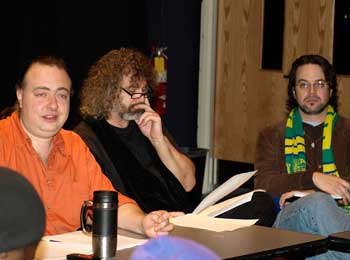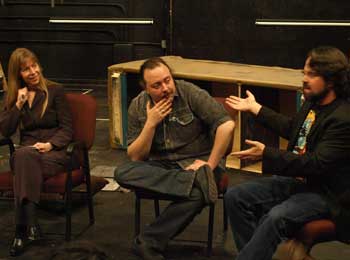A Conversation with
the Translators
Dramaturg Robyn Quick speaks with David White and Yury Urnov about the translation of Martial Arts.
David M. White is a playwright, director, founding member of Generous Company, and Assistant Professor at Towson University. David's plays have been seen in various regional, university and community theaters around the U.S. David works developing new plays as an Artistic Director of WordBRIDGE Playwrights Laboratory (www.wordbridge.org) and founder of the Towson www.generouscompany.org/machinegunnerTheatre Lab. David is currently directing Generous Company’s production of Yury Klavdiev’s I Am The Machine Gunner, which will premiere in September 2010 www.generouscompany.org/machinegunner.
Yury Urnov was born in 1976 in Moscow, Russia. In 2000 he graduated from the Russian Academy of Theatre Arts with an MFA. Since then, he has worked in professional theatres all across Russia and in Moscow. He directed a number of premiers of plays that are part of the Russian New Drama movement. He has collaborated with playwrights Maksym Kurochkin, Olga Mukhina and Vladimir Sorokin. Urnov also directed and taught in Europe, Africa and the U.S.
Martial Arts was commissioned for the Russian Season at the Towson University Department of Theatre Arts, developed with the Center for International Theatre Development.
RQ: What attracted you to the work of Yury Klavdiev and made you want to bring this play to audiences in the United States?
DW:Martial Arts is a play that contains references and provides clear connections that will invite an American audience into the world of the play: references to cinema, characters that feel familiar, and the structure of a fairy tale. Klavdiev's work is steeped in American Cinema and popular culture, but it is uniquely theatrical and brings the pace and aggression of cinema to the stage. The subject matter of Martial Arts and young people living in criminal worlds really speaks to the situation of many children in the U.S. today and connections can be made through this very specific, but universal story. Klavdiev's work speaks to the U.S. audience because it challenges them and presents them with characters and ideas that demand something from all of us, intellectually, emotionally and he demands that we meet the work with our imaginations fully engaged.
YU:One famous Russian writer said that the writer should write either about something he knows very well or about something that nobody knows. Klavdiev, especially in Martial Arts, combines those techniques. He writes the street language he knows, about the environment he knows very well, and he writes about his personal experiences as a kid. I think he still remembers being a kid very well. That’s why kids are very often the main characters of his plays. At the same time, he often and especially here, uses the element of the fairy tale, the folk story, the miracle that nobody knows for sure. But we all hope they do exist, especially in a society where hopes for reality failed.
RQ: Yury, can you talk a bit about how Klavdiev’s work in general, and this play in particular have resonated with Russian audiences?
YU: I think he’s considered a new hope of contemporary Russian writing, for now, mostly within the theatrical community. But this theatrical community really thinks that he’s the next and hottest thing. I think at least for the community it’s very important that he’s coming from this place never before considered in the land of playwrights. Togliatti is not exactly the place you would wait for the next great writer to appear.
I think he proposes a very open dialogue. The way he’s different from many other writers of the previous generation is that he creates very simple stories with very recognizable characters and an obvious understanding for a Russian of what is good and what is bad. And that surprises the audience and wins them. A lot of people find him actually a naïve writer – almost an equivalent to the primitavist in visual art. I think that’s something that Russian culture was lacking for the last decades – somebody saying simple things in a simple voice that are obvious and at the same time deep.
RQ: Could you elaborate on what you mean by a Russian understanding of what is good and bad?
YU: It’s hard to argue with his morality. He says those guys died because they touched the drugs. These kids lived because they prayed. Let’s call the Queen of Spades and get rid of all that crap – bad guys, corpses and heroin.
RQ: David, you have had the chance to speak with Klavdiev and to direct John Freedman’s translation of Klavdiev’s play I Am the Machine Gunner. How did that experience of the playwright and his plays inform your work on this translation?
DW: I've met Yury Klavdiev twice and much like his plays, Klavdiev himself is a bit of juxtaposition of ideals: the punk and the intellectual, the tough and the compassionate. In his works, both I Am the Machine Gunner and Martial Arts, as well as other pieces of his I have read, there are many such binaries at play: the young and the old, the innocent and the corrupt, the realistic and the fantastic are often slammed together to create a new feeling, a new genre or a new way of expressing an idea. I've also spent a lot of time watching a film that Klavidev wrote and studying the rhythms of speech in that work. Initially, I was introduced to Klavdiev's work by seeing a Russian production of I Am the Machine Gunner and I was seduced by the rhythms of his language and finding ways to not only translate his words, but also simulate his rhythms was a real challenge and goal for my work in translating Martial Arts.
RQ: Can you both describe a bit of your process? How did you work together to create this script?
YU: Most of the work is actually David’s. What I did was a literal translation and after that we had a number of meetings – funny ones, I believe. With the help of mimicry and gestures, I was trying to help David understand the nuances of language and humor of the play. From that point, David took over the process, and I believe he still continues to work, editing the text step by step up to the first reading, and through rehearsals.
DW: Yury and I met early on to go over his literal English translation of the first half of Martial Arts. This meeting helped to establish a lot of the underlying contexts for the language. We also had a Skype session to go over the 2nd half of the piece before I began my work bringing the piece into American English. I then worked each line, each word of the play looking for the appropriate American correlative to each turn of phrase or idea, while also considering the rhythms of the original -- was it long-short-short phrasing on that line or short-short-short -- in an attempt to bring Klavdiev to the U.S. stage as faithfully as possible. Yury and I have continued to talk about specific words and phrases throughout the rehearsal process and how Martial Arts can be honed as it is brought to the stage for the first time in any language.
RQ: In some ways this play is informed by Klavdiev’s contact with U.S. culture. For example, characters make reference to films from our country. How did that element of the play inform your choices as translators?
YU: American culture in the 90s and 00s, and especially mass culture seriously affected everybody in Russia, including playwrights. It may be interesting for the Americans to see their own reflection in the mirror – although somewhat transformed by his vision. Of course, it made it easy to translate some things --for example the title of the film Natural Born Killers -- back into English.
DW: Klavdiev's specific connections to U.S. culture provided the freedom to not tie up loose ends or feel the demand to clarify his work. His work seems to echo writers/directors such as Tarantino and Alex Cox in how he constructs the world of this play and his characters, and neither of those men are writers or directors who are afraid of leaving questions in his work. Like these filmmakers, Klavdiev paints his characters in bold strokes, but also very specific strokes and it's fun to embrace the hyper-real world of this play and bring the familiar archetypes from U.S. culture and cinema to the stage alongside the very Russian characters of the grandmother and the Queen of Spades. Similarities to U.S. culture and media such as these provide the context by which the audience can understand the unexpected fantastical leap.
RQ: Despite these connections to our country, the play is quite specifically set in the suburb of a Russian provincial city and is very much about that world. Were there specific Russian cultural references that were a challenge to translate?
DW: I found the ideas and values of the Russian provincial city similar to the big cities of the U.S. Midwest. There were specific ideas from Russian culture, in particular the Queen of Spades, but her American analogue could be located in figures such as Bloody Mary from late nights at children's camp. During the translation process, it wasn't necessary to change the Queen of Spades to Bloody Mary, but to recognize that U.S. audiences could identify the ritual used to summon the Queen as similar to children in the U.S. scaring themselves by summoning Bloody Mary in a mirror. By presenting this world in very specific terms and not adapting it to the U.S., but keeping it in the Russian provincial city, I hope to get to the universal struggles of children to maintain their innocence in the face of corruption through the very specific lens that Klavdiev has provided. These are ideas and struggles faced by children in Russia, in the U.S., in all countries where the parents are children and the children must grow up before their time.
YU: The most problematic was, and still is, the first scene of the play, when the two boys decide to go to the cemetery and get “under-a-dead-body-dirt” for their unknown childish ritual. Klavdiev there is drawing from the specific non-logical childish language when they are imitating adults. They don’t finish sentences. They use slang and jargon. They misuse the words in a very specific Russian manner.
RQ: In this play, that world of childish language exists alongside other kinds of language, such as slang of drug dealers. How did you work to create those diverse worlds for U.S. audiences through your translation choices?
DW: These worlds may be diverse, but they are worlds that U.S. audiences are familiar with from our own lives, newspapers, television and film. These are languages and ideas that, at this point with the widespread influences of pop culture, are grounded in a global cultural identity. Each specific register of language brings specific poetry to the forefront, whether structural, rhythmic or rhetorical. It was my job to find the poetry in all of these language choices. The revelation of the specific experience through the clashes of different languages working in concert, or conflict with one another, is what creates the poetry of Klavdiev's world.

From left, Yury Urnov, John Freedman and David M. White at an early rehearsal reading of Martial Arts. Towson University. December 2009. Photo: Robyn Quick

Robyn Quick, Yury Urnov and David M. White discuss the translation of Martial Arts with audience members. April 2010. Photo: Rachel Blank



